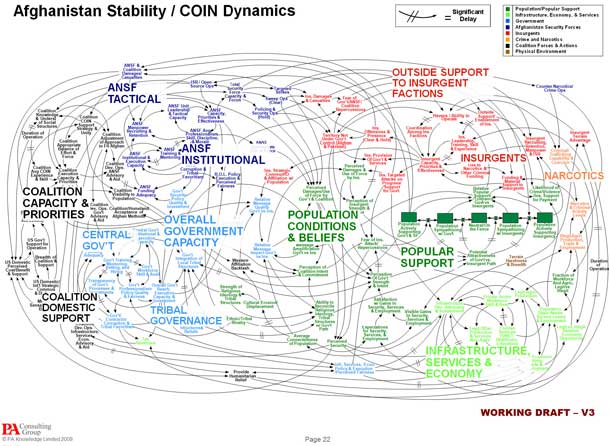
On Tomdispatch, Jo Comerford of the National Priorities Project lays out the costs of the Afghan “surge” and it comes to, oh, $57,077.60 a MINUTE!
Some of the more jaw-dropping facts:
[A]dd up the yearly salary of a Marine from Camp Lejeune with four years of service, throw in his or her housing allowance, additional pay for dependents, and bonus pay for hazardous duty, imminent danger, and family separation, and you’ll still be many thousands of dollars short of that single minute’s sum.
…. we might have chosen to direct the $30 billion in surge expenditures toward raising the average individual monthly Food Stamp allotment by $70 for the next year; that’s roughly an additional trip to the grocery store, every month, for 36 million people. Alternatively, we could have dedicated that $30 billion to job creation. According to a recent report issued by the Political Economy Research Institute, that sum could generate a whopping 537,810 construction jobs, 541,080 positions in healthcare, fund 742,740 teachers or employ 831,390 mass transit workers.
…. [I]f you received a silver dollar every second, it would take you 960 years to haul in that $30 billion. Not that anyone could hold so much money. Together, the coins would weigh nearly 120,000 tons, or more than the poundage of 21,000 Asian elephants, an aircraft carrier, or the Washington Monument. Converted to dollar bills and laid end-to-end, $30 billion would reach 2.9 million miles or 120 times around the Earth.
And the numbers being bandied about are, big surprise here, lowball estimates. What we are looking at is a trillion dollar price tag for the war. Singular. Not a trillion for both Iraq and Afghanistan. Just Afghanistan.
Comerford concludes:
At just under one-third of the 2010 U.S. federal budget, $1 trillion essentially defies per-hour-per-soldier calculations. It dwarfs all other nations’ military spending, let alone their spending on war. It makes a mockery of food stamps and schools. To make sense of this cost, we need to leave civilian life behind entirely and turn to another war. We have to reach back to the Vietnam War, which in today’s dollars cost $709.9 billion — or $300 billion less than the total cost of the two wars we’re still fighting, with no end in sight, or even $300 billion less than the long war we may yet fight in Afghanistan.
But if you’re like me, one look at that chart and you know it’s gonna be worth it!
